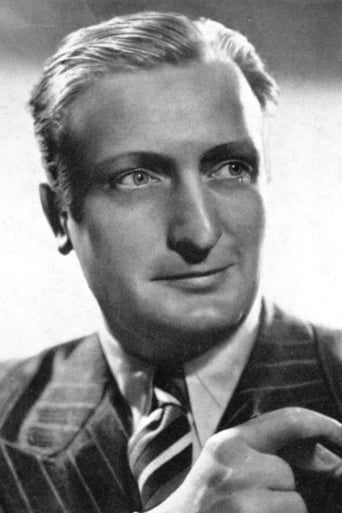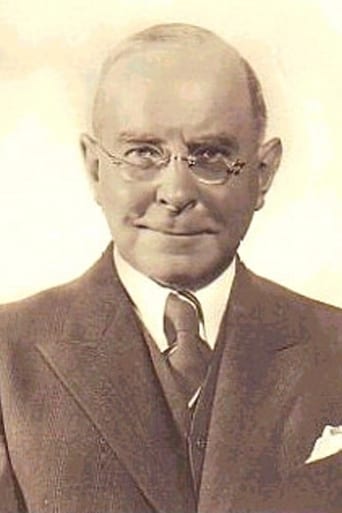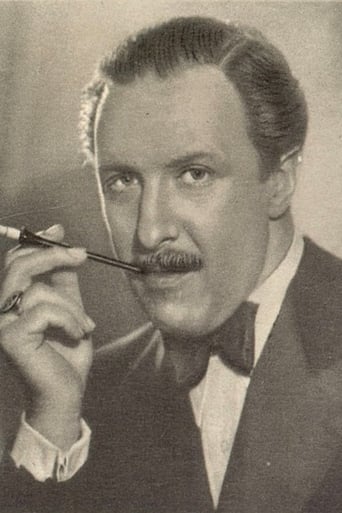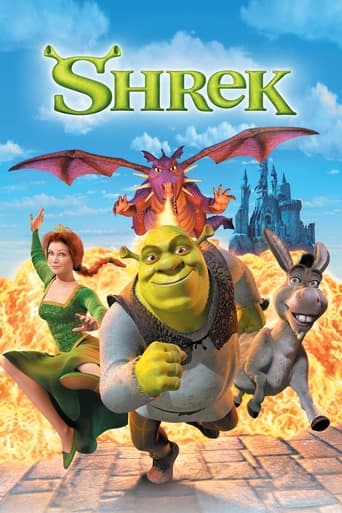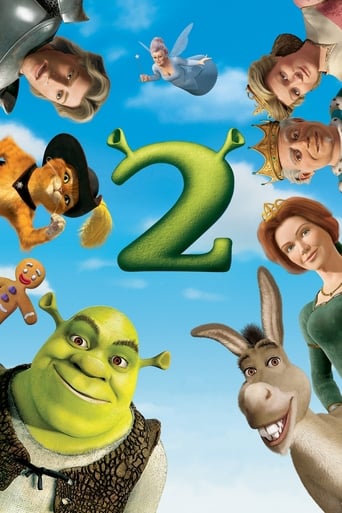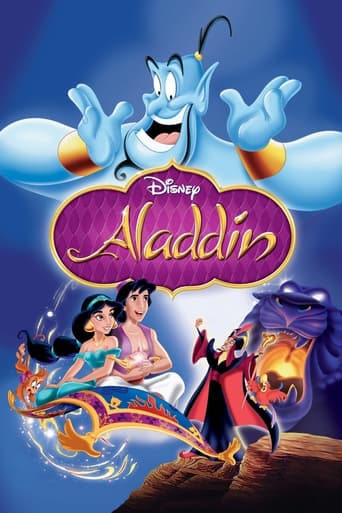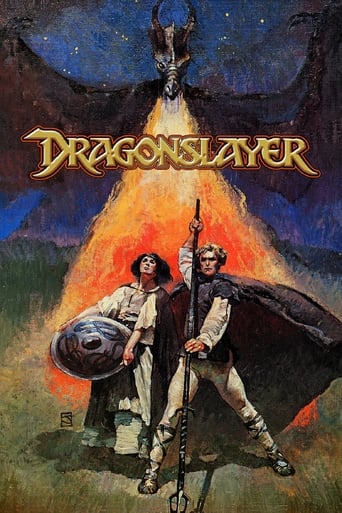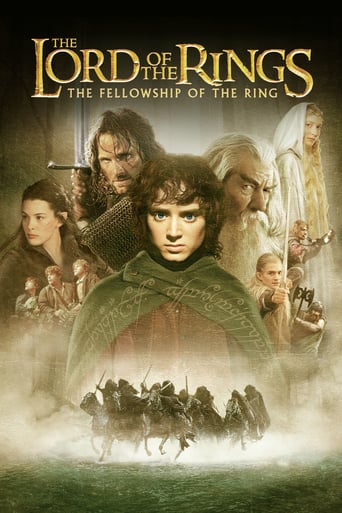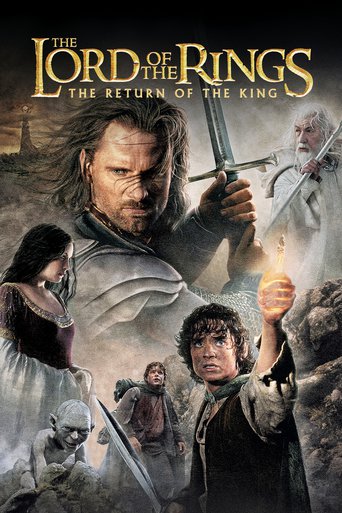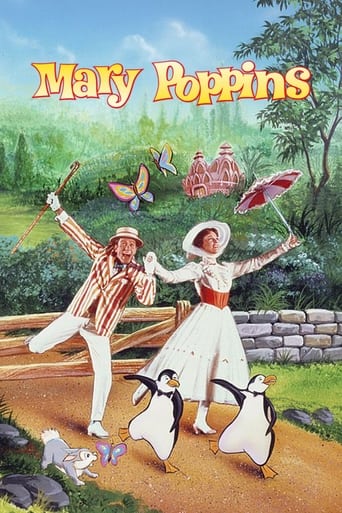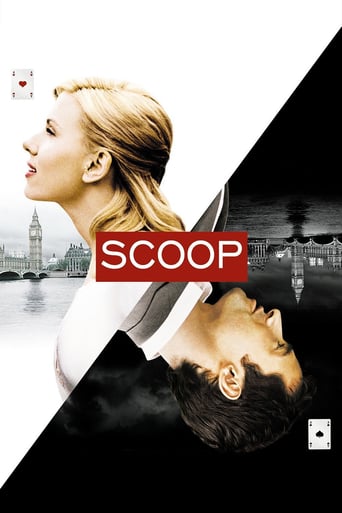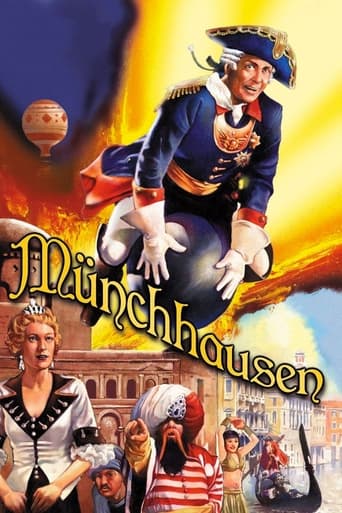
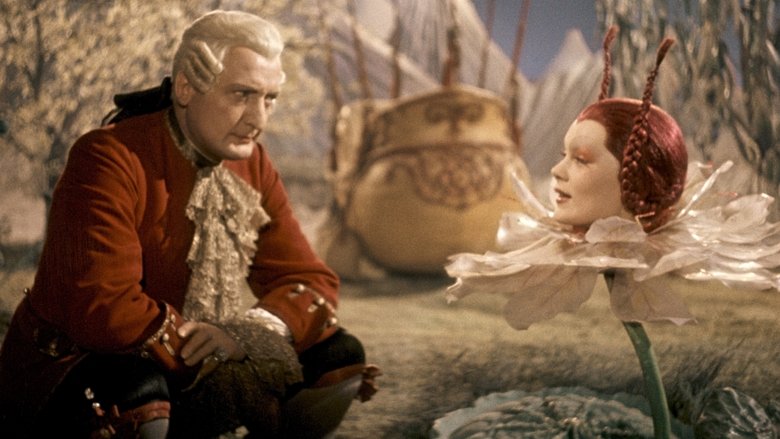
Münchhausen (1943)
Wanting a lavish production to mark the 25th anniversary of UFA, the German film studio, Joseph Goebbels, director of the Nazi propaganda machine, commissioned an adaptation of Baron von Münchhausen‘s “autobiographical” stories. Baron von Münchhausen (1720-97) was an eccentric figure in European history, whose tall tales about his adventures rival anything to be found in the legends of Paul Bunyan or classic figures like Odysseus. This film recounts some of the episodes from the Baron’s sensational stories, which are set in the world of the 18th century.
Watch Trailer
Cast


Similar titles
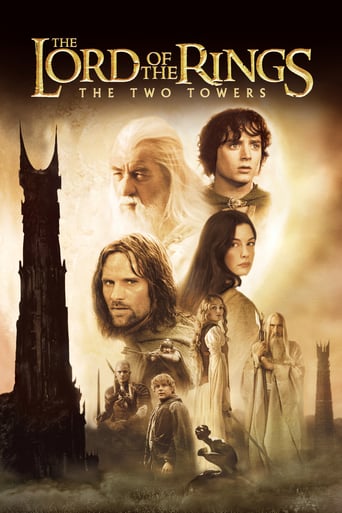
Reviews
When I look at how many people have rated this film, and I think of all the movie lovers out there who have never seen, or even heard of this delightful gem; It saddens me. I truly believe that it is among the greatest achievements in the history of film. The unique pastel colour is magnificent, and the film is filled with hilarious and daring moments. Especially when you consider that Münchhausen is a Nazi era 1943 German film; It really is hard to believe that this is true.Acclaimed director Terry Gilliam of Monty Python and 12 Monkey's fame, obviously tried to draw more attention to this striking wonder when he made his own version of this tale 'The Adventures Of Baron Munchausen' in 1988. If it wasn't for Mr.Gilliam, I probably would have never bothered to even watch this film. So I owe him many thanks as Münchhausen has easily become one of my all time favorite films. The pace, humour, and sheer originality of this fantasy make it one of the easiest subtitled films to watch in existence, period. It ranks up there with the greatest pre-1950's films such as The Treasure Of The Sierra Madre, and Chaplin's brilliant City Lights. If you love movies, if you love classic cinema, if you love original fantasy films, if you love humorous films; Seek out 1943's Münchhausen whatever you do. It will not disappoint. This film is certainly not for children. However, in terms of flat out fantasy entertainment, I would say that this nearly 70 year old antique blows away Peter Jackson's Lord Of The Rings films any day, and easily. Enough said.9/10
You've got to hand it to that Josef Goebbels. When the little club footed maniac wasn't busy trying to get into the pants of every starlet of the German cinema, his UFA Studios could turn out some good work. Such is the case of the lavish spectacle Munchhausen. The color cinematography and special effects definitely equal the quality of anything Hollywood could do.The Munchhausen Stories in German culture are akin to Jonathan Swift's Gulliver's Travels. The author Rudolf Erich Raspe was trying for Swift like satire of the political events of his time. In time though they became beloved for their face value alone. In fact the protagonist became a synonym, Munchhausen's syndrome is a diagnosis for one who tells exaggerated stories or outright lies the better to ingratiate themselves with another individual or a group.In fact at the same time that German romantic cinema star Hans Albers was doing Munchhausen over in Germany, a different kind of Munchhausen was popular in America. Jack Pearl, a former vaudevillian, had a radio series based on the Munchhausen character and his famous line to those who questioned the authenticity of his stories was "Vas you dere Charlie". Quite popular back in the day.The story of the fabled Munchhausen is told in flashback during a party in modern Germany by the current Baron Munchhausen . By the way, another reviewer said that it would be Germany in the Thirties before World War II started. Not necessarily because the Nazi regime was notorious for not asking the kind of sacrifices demanded of its civil population until late in the war. Such a lavish type party was definitely in keeping with the regime's culture of the time.Though Goebbels kept it light as he did most of UFA's product except those that were outright propaganda, they did get their shots in. During the part of the film concerning Munchhausen's visit to Imperial Russia, the German background of Catherine the Great played by a fetching Brigitte Horney is emphasized. Catherine was a name she took when she married the Czar, she was in fact Sophia of Anhalt-Zerbst. Also there is a scene when Pugachev, the peasant leader of a revolt in Siberia, is brought in caged like an animal and looking like something from Dr. Moreau's laboratory. Pugachev was later played by Van Heflin in the film Tempest in the next decade. The caricature was definitely in keeping with the Nazi ideas to depict Slavic people as some kind of subhumans, almost as bad as Jews.Throughout the film as Munchhausen travels from St. Petersburg, to Istanbul, to Venice and even the moon, Albers's faithful sidekick is Herman Speelmans who is like Sancho Panza or even Gabby Hayes if you will. Speelmans does a fine job and dies on the moon in a beautifully played scene.As the propaganda is kept to a minimum, Munchhausen has survived to be appreciated on its own merits which are considerable.
This is a perplexing film. For all of its ambition, it falls to pieces regularly. There are moments of beauty and spectacle, but never long enough to stick; moments of humor and sentiment are brief and forced. There is no suspense, no real sex, no warmth and ultimately, no heart. One can be impressed, but not moved. For all the fashionable dumping on Hollywood, American pictures of this era, even when stupid, never reached the bleak, impersonal aridity of this epic.Also, the VHS version I saw began with screen notes mentioning that there were few technicians in 1943 Germany who were familiar with special effects. The reason given was that nothing on this scale had been attempted since the silent era. This is dishonest nonsense. The real reason was that the majority of German special effects people had either exiled themselves abroad or been incinerated. The German film industry didn't begin to recover from the Nazis until the 1970's.Terry Gilliam's recent remake is neither better nor worse, just different.
***SPOILERS*** ***SPOILERS*** This lavish production in Agfacolor, ordered by Goebbles himself, was made to mark the 25th anniversary of the German UFA-Studio. The film begins with a gala 18th century ball at the Bodenwerder castle by the jovial Baron Muenchhausen and his wife. There is a sudden lovers' quarrel between two of the guests. The young girl flees and jumps into her car. We have been viewing a costume party, and the period is very definitely the present. The baron and his much older wife attempt to reconcile the pair. He tells them of the adventures of his "ancestor", the fabulous Baron Muenchhausen, and the film goes into flashback, this time to the real 18th century. Muenchhausen and his servant Christian visit the baron's father, who is puzzled over Christian's invention of a rifle which can see and shoot a distance of 200 kilometers. After the visit the pair decides to go to Braunschweig at the invitation of the Prince of Brunswick to whom the Empress Catherine the Great has offered a command of a Russian regiment. The prince asks for Muenchhausen's help in convincing his lovely mistress Louise la Tour to make the trip, and when this is accomplished the group sets off for Russia. The dealings at the Russian courts are devious. The magician Cagliostro tries to enlist Muenchhausen in a plot against the empress, but without success. At a carnival the baron meets a young girl named Kaetchen who is later revealed to be the Catherine in disguise. Muenchhausen becomes Catherine's new lover, kindling the jealousy of the former favorite, Prince Potemkin, who challenges the baron to a duel, injuring him slightly. Muenchhausen goes to the sinister loking house of "Doctor" Cagliostro to have his wound treated, and while there warns Cagliostro that he is about to be arrested. Although the magician knows this, he rewards the baron with the secret of eternal youth, and also gives him a ring that will amke him invisible for one hour. As the secret police breaks into the house, Cagliostro escapes using magic to amke him invisible. Catherine soon tires of Muenchhausen and sends him to Turkey in command of a regiment. He is inadvertently shot on a cannonball to Constantinople where he becomes a prisoner of the sultan. After a period of imprisonment he is reunited with his servant, Christian. The baron is offered his freedom if he will convert to Moslem religion. He explains to the sultan that this would be impossible because he would have to drink water instead of wine, but the sultan tells him he does not really abstain - and gives a sample of his private stock of Tokay. Muenchhausen insists that the Tokay he drank at the palace of the Empress Maria Theresa in Vienna was twice as good. This leads to a bet in which the baron promises to provide the sultan with a bottle from Vienna in an hour. If he wins the bet he will have his freedom. Thanks to a wonderful runner, the bottle is produced, leading to a second wager. If the wine is indeed better than the sultan's, Muenchhausen will be rewarded with the beautiful Princess Isabella d'Este, a prisoner in the harem. Muenchhausen wins this bet too, but the Sultan reneges on his promise, attempting to pass off the aging Louisa la Tour as Isabella. Using the magic ring, the baron invades the harem, abducts the real princess, and sets sail for Venice. He learns that the girl's family had planned to marry her to an old man. She had fled the city but was abducted by pirates who sold her to the sultan. Her sudden return is no joy to the family, and her wicked brother Francesco has her kidnapped a second time and locked up in a convent. Muenchhausen fights a duel with Francesco that results in the latter's clothes being cut to ribbons. Muenchhausen and Christian, with the d'Este family in pursuit, escape Venice in a balloon conveniently anchored in the Grand Canal. Their vehicle takes them to the moon. There, in a surrealist landscape, Christian ages and dies, because one day is equal to a year on earth - but Muenchhausen is, of course, immortal. His gloom is dispelled by the presence of the wife of the Man in the Moon. She can be in two places at the same time by separating her head from her body. But even her charms soon pale, and the baron returns to Germany. The scene now shifts back to the present (presumably the 1930s) where Muenchhausen tell the startled young couple that he and his distinguished "ancestor" are one and the same. Thoroughly frightend, they flee the castle. The baroness, having observed that her husband is attracted to the girl, tells him to follow his new love. Instead, he renounces the gift of eternal youth to grow old with her.This film has been a favorite of mine since my childhood. Therefore, I can highly recommend it. In my opinion, this version is much better than the 1988 offering by Terry Gillian.


